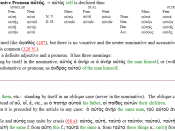Sexism in language is the use of gender-specific words which are thought to be discriminatory against women, and the use of expressions which encourage stereotypical images of men and women.
The Merriam-Webster Dictionary of English Usage states that the issue of sexism in language is a social, rather than linguistic one. According to Ebitt & Ebbit 1982, rather than head for the extremes, the word selection regarding sexism should fall upon the ?middle-of-the-roaders.? The extremists are already entrenched in what they consider acceptable.
To be more conciencious of sexism in language, one should be aware of the areas concerning nouns and pronouns.
For example occupational titles that have the word ?man? in them, such as fireman and salesman, can be replaced with gender-neutral terms such as firefighter and sales representative. Many of these old occupational titles are becoming obsolete as new generations are brought up being familiar with their replacements.
An example would be the frequency of which ?flight attendant? is becoming a replacement for ?stewardess.? There is still limited success in adopting the suffix -person for -man in words like ?chairman? and ?congressman.? For pronouns, Merriam-Webster states that, ?Feminists have merely given new emphasis to an old problem,? referring to the use of the pronoun ?he? as routine. Some solutions offered are; 1) use ?his or her,? 2) omit the pronoun or substitute an article, and 3) change subject and pronoun to the plural form. Merriam-Webster thinks the attempt by theorists to make up forms of pronouns to be gender neutral is a bit ridiculous. They simply recommend that one be mindful to the usage of careless and thoughtless gender-biased language, and when sensible, remedy it with the solution that best fits the context.
In his article, ?Towards an Overview of Work on Gender and Language Variation,? Clive Grey...


